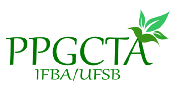Banca de DEFESA: ALLANA SOUZA DE CARVALHO
Uma banca de DEFESA de MESTRADO foi cadastrada pelo programa.STUDENT : ALLANA SOUZA DE CARVALHO
DATE: 31/05/2023
TIME: 14:00
LOCAL: Metapresencial através do link: https://meet.google.com/rwg-kezf-jkz
TITLE:
Use of deep eutectic solvents in the extraction of chemical constituents of Miconia albicans (Sw.) Triana
KEY WORDS:
Herbal medicines, phenolic compounds, plant species
PAGES: 48
BIG AREA: Outra
AREA: Ciências Ambientais
SUMMARY:
For a long time the human being uses plant species for the treatment and cure of various pathologies. Although several substances have already been isolated, there are still many compounds that are unknown due to the immense biological diversity present in the plant kingdom. These compounds from vegetables may have beneficial actions on human health, such as antioxidant action. Antioxidants that are compounds with abilities to prevent or inhibit the impact of free radicals that are associated with the development of chronic diseases like diabetes and cancer. Generally, the extraction of these bioactive compounds are carried out by liquid-liquid or solid-liquid extractions by the use of solvents that usually have some harmful effects on the environment. Thus, the dissertation presents the study divided into two articles. Where the first aims to compare the efficiency of the extraction of eutectic and conventional solvents in the extraction of phenolic bioactives, flavonoids and antioxidant of Miconia albicans (Sw.) Triana. In this context, eutectic solvents were prepared and characterized and evaluated the antioxidant capacity by the method of sequestration with the free radical DPPH, phenolic and flavonoid contents, in addition to the chemical characterization by the identification of phenolic acids by HPLC-DAD. In the second article, we sought to compare the extraction of bioactives from the commercialized M. albicans versus the native plant collected in several regions of the Atlantic Forest South of Bahia. Thus, the results indicated that the extraction by the use of the deep eutectic solvent (DES) demonstrate to be more effective in the evaluations of the constituents in M. albicans, being a cleaner and greener alternative than conventional solvents.
COMMITTEE MEMBERS:
Interno - ***.287.925-** - ALLISON GONÇALVES SILVA - IFBA
Externo à Instituição - BRUNO MOREIRA OLIVEIRA - UFBA
Externa ao Programa - 1642871 - FLORISVALDA DA SILVA SANTOS - nullPresidente - ***.189.235-** - LUCIANO DA SILVA LIMA - IFBA



